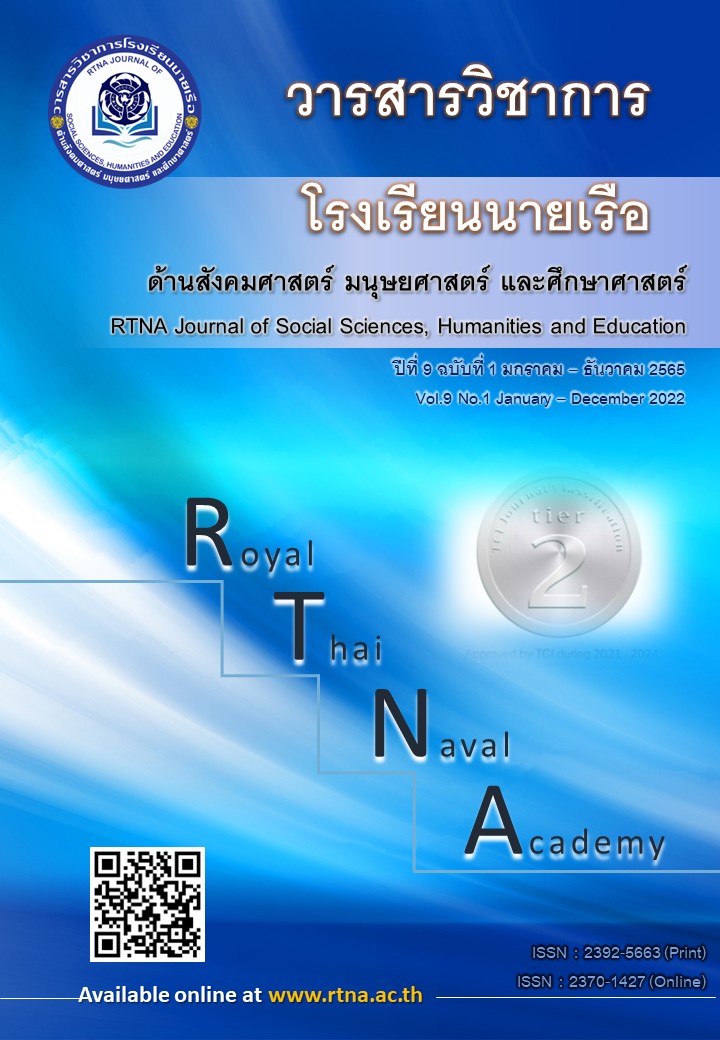The Solution of Rohingya Refugee in the Maritime National Security Dimension
Keywords:
Smuggling, Rohingya, Maritime National SecurityAbstract
This research examines the maritime smuggling of Rohingya regarding Maritime National Security with the objectives which are (1) to scrutinize the real reason of Rohingya smuggling (2) to study the impact of Rohingya maritime smuggling on Maritime National Security and
(3) to find the appropriate and sustainable methods for solving the illegal immigration problem of Rohingya smuggling in Thailand. This research is the qualitative research by using In-depth interview from stakeholders who related in this field and including with studying the related research ideas and theories for designing the interview questions. The information from the experts reveal that the evolution of Rohingya immigration has changed. The more travelling in the sea, the less stopover in Thailand. The origin is from Rakhine state, Myanmar to the destination countries which are Malaysia or Indonesia whereas Thailand is either destination or transit state. The reasons of Rohingya smuggling have been transformed from economic reason to the right of citizenship, oppression and violence in Rakhine state. The summary of research is that the impacts of Rohingya smuggling on the Maritime National Security are moderately negative effects which regard to the marine safety and involved in transnational crimes, human trafficking, using a boat without flag and the maritime immigration which consequences from land security.
References
บุญชัย มรินทร์พงษ์. (2556). ผู้อพยพทางเรือ: ภารกิจของทหารเรือกับปัญหาสิทธิมนุษยชน. กรุงเทพฯ: วิทยาลัยรัฐธรรมนูญ สำนักงานศาลรัฐธรรมนุญ.
เบญญา บุญส่ง. (2560). การดำเนินการของประเทศไทยต่อกรณีการโยกย้ายถิ่นฐานแบบไม่ปกติในมหาสมุทรอินเดียของชาวโรฮินจา. วารสารรัฏฐาภิรักษ์, 59(2), 23-34.
วชิรพร วงศ์นครสว่าง. (2563). ประเด็นปัญหาความมั่นคงกับกิจการทางทะเล. กรุงเทพฯ: จุฬาลงกรณ์มหาวิทยาลัย.
ศิลปคมณ์ เอี่ยมวงศ์, สิตานนท์ เจษฎาพิพัฒน์ และฉัตรวรัญ องคสิงห์. (2559). การจัดการปัญหาการลักลอบเข้าเมืองของชนกลุ่มน้อยชาวโรฮีนจา. วารสารรังสิตบัณฑิตศึกษาในกลุ่มธุรกิจและสังคมศาสตร์, 1(2), 22-35.
อริยพร โพธิใส. (2552). สารพันปัญหากฎหมาย: โรฮิงญากับการค้ามนุษย์. จุลนิติ, มี.ค.-เม.ย., 115-119.
Jameekorn Pinsuk. (2017). Patterns and routes of the foreign victims of human trafficking in Thailand. (Dissertation for Master of Art in International Social Policy School of Social Policy Sociology and Social Research). University of Kent.
United Nations High Commissioner for Refugees (UNHCR). (2014). South-East Asia: Irregular Maritime Movements January-June 2014. Retrieved เดือน วัน, ปี, from https://www.unhcr.org/protection/migration/53f1c5fc9/unhcr-report-irregular-maritime-movements-south-east-asia-januaryjune-2014.html
United Nations High Commissioner for Refugees (UNHCR). (2021). Left Adrift at Sea: Dangerous Journeys of Refugees Across the Bay of Bengal and Andaman Sea January 2020 - June 2021. Retrieved เดือน วัน, ปี, from https://www.unhcr.org/asia/publications/operations/611e15284/left-adrift-at-sea-dangerous-journeys-of-refugees-across-the-bay-of-bengal.html
United Nations Office on Drugs and Crime (UNODC). (2017). Trafficking in persons from Combodia, Lao PDR and Myanmar to Thailand. Retrieved เดือน วัน, ปี, from https://www.unodc.org/documents/southeastasiaandpacific/Publications/2017/Trafficking_in_persons_to_Thailand_report.pdf
United Nations Office on Drugs and Crime (UNODC). (2018). Migrant Smuggling in Asia and the Pacific: Current Trends and Challenges Volume II. Retrieved เดือน วัน, ปี, from https://www.unodc.org/documents/human-trafficking/Migrant-Smuggling/2018-2019/SOM_in_Asia_and_the_Pacific_II_July_2018.pdf
Downloads
Published
Issue
Section
License
Copyright (c) 2022 Royal Thai Naval Academy

This work is licensed under a Creative Commons Attribution-NonCommercial-NoDerivatives 4.0 International License.
The author has the sole responsibility for the material published in RTNA Journal of Social Sciences, Humanities, and Education, which the editorial team may not agree on that material.
RTNA Journal of Social Sciences, Humanities, and Education owns the copyright of the text, the illustration, or other material published in the journal. No parts or the whole of the material published may be disseminated or used in any form without first obtaining written permission from the academy.






